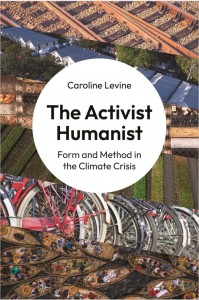From an Article by David Nutt, Cornell Chronicle, October 25, 2023
When it comes to combating climate change, one resource has been woefully neglected, according to Caroline Levine, the David and Kathleen Ryan Professor of Humanities in the College of Arts and Sciences.
Humanities scholars have an important role to play in the current political struggle to stave off environmental collapse, Levine argues in her new book, “The Activist Humanist: Form and Method in the Climate Crisis,” published Oct. 17 by Princeton University Press.
“Climate change is our horizon now. It’s threatening everything we care about, from racial justice to mountain climbing, and from architectural history to our grandchildren,” she said. “Humanists have the tools to address all social and political struggles, and I hope we can act together now to keep the planet from irreversible tipping points and the unthinkable suffering that will follow.”
Question: What has traditionally prevented people in the humanities from engaging in direct political action?
Answer: In the humanities, we ask students to pause and question our world. We often say that works of art – because they’re complex and challenging and open-ended – are especially good at making us stop and think. And we argue that this kind of interruption is especially urgent in a society like ours, which tries to turn every aspect of our lives to financial profit.
I agree with this argument. But in the midst of the climate crisis, I started to worry: What if our insistence on open-endedness prompts humanists to avoid thinking about planning and building, and reinforces the notion that humanities scholars can’t – and shouldn’t even try to – stop the worst ravages of climate change? What if we have knowledge that could help to get us out of the climate crisis, but we’re disempowering ourselves?
Q: What is it about humanities students and scholars that makes them good candidates for activism?
A: I’ve been arguing that the students and scholars of the arts have a particularly powerful set of methods that can help us to change the world, which I call “formalism.” Traditionally, formalists investigate the shapes and structures that organize works of art, such as meter or vanishing-point perspective. I deliberately define form more broadly than that – as any shape or configuration of materials, any arrangement of elements, any ordering or patterning.
Political life, according to my expansive definition, is very much a matter of form. Powerful groups impose order on space, for example, such as segregated neighborhoods and national borders. Politics operates through organizations of time, too, from the age of consent to the global pace of historical progress.
Right now, the political form most Americans immediately understand is individual consumer choice. The problem is, we’re not going to solve climate change by policing our own individual consumer decisions, no matter how much we recycle or buy electric cars. It was actually British Petroleum that invented the “carbon footprint” to turn public attention away from their plans to keep mining and drilling.
My book argues that a formalist analysis can help us to organize ourselves into collective forms that could actually make meaningful structural change.
Q: How did this movement toward political engagement emerge in your life? Was there a specific moment or incident that motivated you?
A: I became an environmentalist in the wake of Hurricane Katrina, when it became suddenly, painfully clear to me that my government wasn’t even going to try to protect ordinary citizens from climate devastation. But it was really in 2011, when I was a professor at the University of Wisconsin, Madison, that I started to pay attention to activist forms. The state legislature forced us to allow guns in classrooms, and tried to change our mission from the pursuit of truth to job preparation. Luckily, the University of Wisconsin survived these assaults, but it took every ounce of energy from a huge mass of us to fend them off.
Q: “The Activist Humanist” concludes with something rarely seen in an academic text: a workbook.
A: Today more than 50% of Americans are concerned or alarmed about global warming, but most say they don’t know what they can do about it. The workbook presents a series of questions and tasks designed to prompt readers to start taking effective political action – and to stay engaged over time.
Q: If practical political activism is a way to avoid the hopelessness and paralysis that many humanists in academia experience, do you have any advice for what to do when political activism, which can be rife with setbacks and disappointments, also begins to feel hopeless?
A: The history of activism is a history of setbacks and disappointments! But it’s also a history of victories, and we don’t talk enough about those. Most of us know about the Civil Rights Movement and women’s suffrage, but activist movements have shaped almost every aspect of our lives, from making sure there’s no arsenic in our pepper to creating public parks, eradicating smallpox and ensuring we all learn some math. You have generations of labor activists to thank for medical leave and worker safety protections. Just a couple of years ago, a Girl Scout troop that included current Cornell student Jay Sobers ’25 successfully pressured New Jersey to impose a statewide plastic bag ban, which is taking more than 8 billion bags out of circulation every year.
Those who are feeling hopeless might also be interested to learn that activism is good for our mental health. So, what do you have to lose? Come for the boost to your mood. And stay for meaningful social change.

